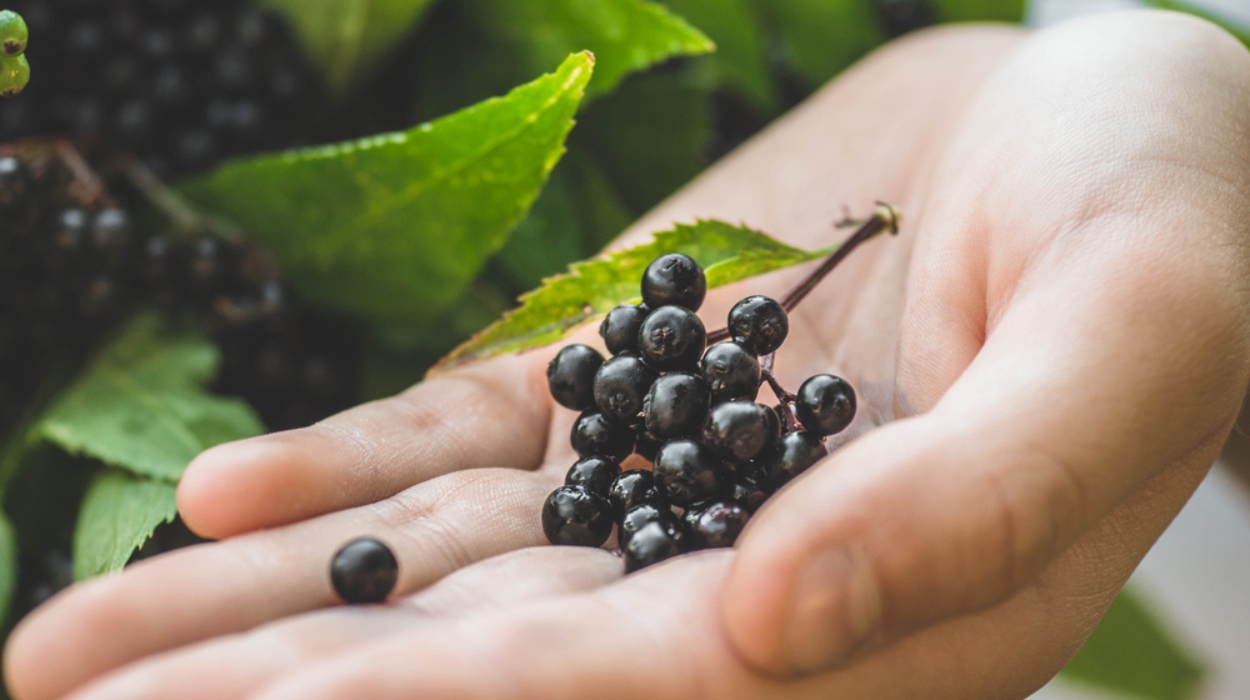Elderberry is a rich natural source of health-promoting bioactive compounds and has a long history of use in folk medicine. This dark purple berry is traditionally used as a natural remedy for colds and flu, but its health benefits don’t stop there.
Over recent years, research has uncovered[1] more of elderberry’s antiviral, antioxidant, and antitumor properties. Elderberries are gaining popularity as one of the world’s healthiest fruits, but what are the main benefits of elderberries? Read on to learn how elderberry supplements, syrups, and teas could boost your well-being.
Benefits Of Elderberry
- Boosts cardiovascular health.
- Eases cold and flu symptoms.
- Relieves digestive problems.
- Benefits skin health.
- Protects against diseases.
Elderberry Health Benefits
Black elderberry, or Sambucus nigra, is a medicinal plant with a variety of potential health benefits. Daily elderberry supplementation could stimulate your immune system and accelerate your recovery[2] from cold and flu. It could also reduce your long-term risk of serious illnesses[3] like cancer, cardiovascular disease, and neurodegenerative disorders like dementia.
Boosts Cardiovascular Health

Elderberry is naturally high in antioxidants,[3] which could significantly benefit your cardiovascular health.
Oxidative stress is a harmful process[4] in which reactive, oxygen-containing molecules damage cells and tissues throughout the body. This damage can contribute to many serious medical conditions, including cardiovascular diseases[5] like coronary artery disease, stroke, and heart failure. Antioxidant foods and supplements, such as elderberry, could mitigate some of this damage and may help prevent cardiovascular disease.[6]
Elderberry may also reduce your risk of cardiovascular disease by helping lower cholesterol levels. Elderberry extract has been found to reduce cholesterol in mice[7] and slow the progression of atherosclerosis.
Atherosclerosis is the build-up of fats or cholesterol in the arteries. This process narrows the arteries, making it harder for blood to flow through them. Atherosclerosis is the leading cause of heart disease and stroke and is responsible for around 50% of all cardiovascular deaths.[8]
Therefore, regularly consuming elderberries in the form of tea or supplements could help keep your heart healthy.
Natural Remedy For Colds And Flu
European elderberry is traditionally used to treat upper respiratory infections like colds and flu.
This is because elderberry has antiviral properties and has been found to inhibit flu virus infection.[9] It prevents the virus from binding and invading cells in the respiratory tract. As viruses can’t replicate outside of a host cell, this stops them from multiplying and reduces the spread of infection.
Elderberry has been found[2] to ease cold symptoms and could treat fever, sore throat, headaches, and nasal congestion. In one study, consuming elderberry was found to reduce the duration[10] of a cold by two days. It was also suggested that elderberry has a mild preventative effect against the common cold.
Elderberry could also boost immunity by stimulating the immune system, as it may play a role in activating T cells.[11] T cells are immune cells that fight off invading pathogens, so stimulating them with elderberry may reduce flu and cold duration.
Eases Digestive Problems
Black elderberry has laxative effects and is often included in herbal remedies for constipation.[1] Drinking elderberry tea or using other elderberry products could promote regular bowel movements and sound digestive health.
Elderberry may also function as a prebiotic, encouraging the growth of beneficial gut bacteria. This can improve the diversity of your gut microbiome, i.e., the population of microorganisms in your digestive tract. Maintaining a healthy gut microbiome is crucial for your overall health[12] and can reduce your risk of several chronic diseases.
Researchers found that people taking elderberry capsules for nine weeks saw significant improvement in their gut microbiome diversity.[13] This means using elderberry products could improve your general digestive health and, consequently, your overall well-being.
Benefits Skin Health

Research suggests that the antioxidant and anti-inflammatory effects of elderberry products could improve skin health.
The anthocyanins in black elderberry may reduce skin damage[14] caused by oxidative stress and enzymes called proteinases. Proteinases degrade proteins in the skin,[15] such as collagen and elastin, and could contribute to the formation of fine lines and wrinkles. Therefore, topical application of elderberry extract could help slow skin aging.
Elderberry extract may also promote collagen synthesis[16] and help mitigate sun damage. These findings suggest that elderberry could have future skin care applications and contribute to more youthful-looking, healthy skin.
Protects Against Diseases
Chronic inflammation, in which the immune system’s normal inflammatory response fails to resolve itself, is a global health concern. It contributes to around half of deaths worldwide and could increase your risk of autoimmune disorders, neurodegenerative diseases, cancer, and more.[17]
Elderberry and elder flowers have anti-inflammatory properties[18] that could help mitigate the damaging effects of chronic inflammation. Combined with the antioxidant effects of elderberry, this could help prevent[19] a wide range of medical conditions and promote long-term health.
What Is Elderberry?
Elderberries are the fruits of the Elder tree, which is a flowering tree with varieties native to both Europe and North America.[20] Their dark purple color is produced by pigments called anthocyanins, which are the most abundant type of polyphenol[21] in elderberries.
Polyphenols are naturally occurring plant compounds with potent antioxidant properties,
and they produce most of the health benefits associated with elderberries.
Elderberry has been used for a long time in folk medicine, primarily as a treatment for respiratory illnesses. Research has recently confirmed[1] elderberries’ antiviral, antioxidant, and anti-inflammatory effects and health benefits.
Elderberries can be consumed in tea, but elderberry extract can also be used in dietary supplements. Elderberry supplements contain the same active compounds as the fruit and can be taken daily to boost your antioxidant intake.
Elderberry Side Effects
Cooked elderberries are generally safe to consume,[22] and most people can use elderberry supplements without any side effects.
However, raw elderberries, leaves, and stems may be dangerous if ingested. This is because elderberry contains sambunigrin and prunasin,[1] two toxic substances that are converted to hydrogen cyanide during digestion. Therefore, consuming raw elderberries can lead to cyanide poisoning with symptoms including[23] vomiting, diarrhea, rapid pulse, and convulsions.
For this reason, you should avoid fresh, raw berries and only buy elderberry products from reputable supermarkets or health food stores. Dried berries are safe to use and can be made into tea. Alternatively, you can look for dietary supplements or green powders containing elderberry ingredients.
Who Should Not Take Elderberry?
Most people can take elderberry every day without side effects, but pregnant and breastfeeding people are advised not to.
Elderberry has no known harmful side effects for pregnant or lactating people. However, due to the lack of evidence on this topic, elderberry products are not recommended[24] for these individuals. Further research is needed to establish whether elderberry products are safe to consume during pregnancy and breastfeeding.
How To Use Elderberry?
Elderberry tea is one of the most popular ways to consume elderberry. You can make it using elderberry tea sachets, which typically contain a mixture of elderberry and other herbal ingredients. Alternatively, you can brew your own elderberry tea at home using dried berries.
To make elderberry tea, use dried, cooked berries from a reputable supermarket or health food store. Add one cup of the berries to four cups of water, bring to a boil on the stove, then reduce to a simmer. Cook your berries for around 15 minutes or until the water takes on a rich, purple hue.
Plain elderberry tea has a sweet, slightly tart taste and a light floral scent. You can boost the flavor profile of your tea by adding lemon juice, cinnamon sticks, ginger, or turmeric. Some people like to sweeten their tea with honey or agave syrup.
If you prefer sweeter drinks, look for elderberry juice at your local health food store. Elderberry syrup is also widely available and may be more palatable for those with a sweet tooth. However, those trying to eat fewer grams of sugar per day should be mindful of these products’ high sugar content.
Supplements containing elderberry extract are also becoming more popular and widely available. For example, elderberry gummies can be a tasty and convenient way to enjoy the benefits of berries.
How Much Elderberry Should You Take Per Day?
There is no official recommendation for how much elderberry you should take per day. However, elderberry is well-tolerated by most people and can usually be taken multiple times a day.[25]
If you drink elderberry tea, you may want to drink one or two cups per day. Many people like to drink elderberry tea at bedtime as it’s caffeine-free and can, therefore, promote a good night’s sleep. It’s also a good accompaniment for a healthy, late-night snack.
When you’re working out how to start eating healthy, taking diet supplements can help you meet your nutritional goals. If you’re using fruit and vegetable supplements containing elderberry extract, follow the manufacturer’s instructions for optimal dosage. When used as a treatment for flu, the dose used in clinical trials[26] is 15 ml of elderberry syrup four times per day for 5 days.
Most people can use elderberry products several times a day without experiencing side effects. However, as elderberry is a natural laxative, excessive consumption could cause digestive issues.
Conclusion
The European Elder tree is a flowering plant whose fruits, leaves, and flowers have long been used for medicinal purposes. It is traditionally used to treat respiratory illnesses, but international medical research has uncovered many other health benefits.
Elderberry fruit is a rich source of polyphenols, which are plant compounds with strong antioxidant and anti-inflammatory effects. These function as natural medicines and can reduce your risk of medical conditions associated with oxidative stress and chronic inflammation.
You can enjoy the benefits of the black elder in tea, syrup, or supplement form. Most people can tolerate Elderberry well, and a daily dose could help safeguard your long-term health.
Frequently Asked Questions
You can take elderberry products every day if you like, even multiple times per day. Elderberries are well-tolerated by most people and are unlikely to cause side effects. However, elderberries have laxative properties, and excessive consumption may cause stomach problems.
Elderberry is a rich source of polyphenols, which are naturally occurring compounds found in plants. Polyphenols have antioxidant and anti-inflammatory properties, which may produce long-term health benefits.
Elderberry is a natural treatment for respiratory infections and may reduce the duration and severity of cold and flu symptoms. When taken regularly, it could also benefit immune function, boost cardiovascular health, and protect against serious medical conditions.
The bioactive compounds in elderberry have antioxidant properties and can mitigate the damage caused by reactive oxygen species. Therefore, they may protect your body from oxidative stress and reduce your risk of a wide range of health problems.
 Evidence Based
Evidence Based
